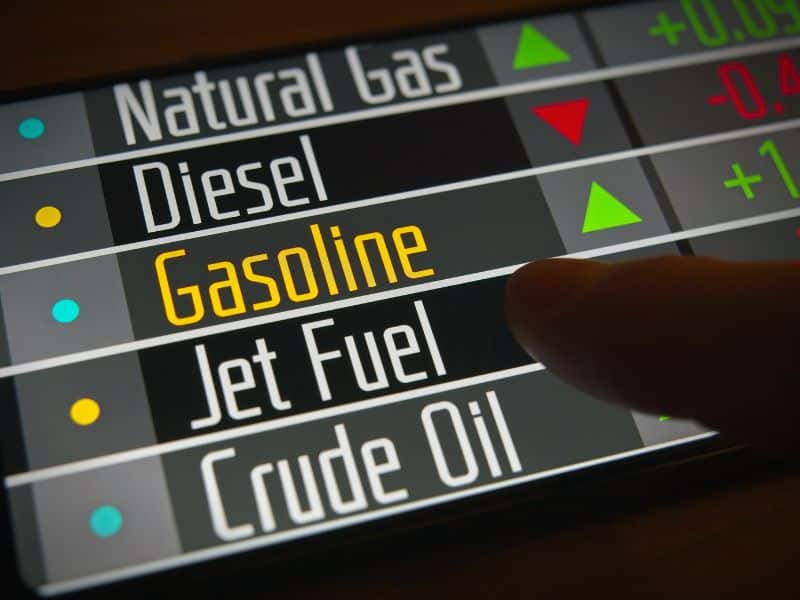Fuel is one of the world’s most consumed goods, and the statistics amazed me. Since it is one of the most finished goods, people want to know more about what they are buying, and the first question is, how much does a gallon of gasoline weigh?
When you’re wondering about the weight of gasoline, it’s no wonder that people have more questions.
But this article will go even more profound than just how much gas weighs.
Table of Contents
How Much Does A Gallon Of Gasoline Weigh?
Many factors can alter the weight of gasoline, but in short, 1 US gallon of gasoline equates to 6.25 pounds or 2.83 kilograms, and 1 Imperial gallon of gasoline equates to 7.2 pounds or 3.27 kilograms.
Keep this in mind when buying a jerrycan so that you can still easily lift it when full of gasoline.
To help you understand where it stacks up with other known fluids, here is a list comparing them:

How Much Does A Gallon Of Water Weigh?
1 US Gallon of water weighs 8.34 pounds or 3.785 kilograms.
This means that water is heavier than gasoline, so when thrown into the same container, the gas will rest on top of the water and be completely separated from one another.
How Much Does A Gallon Of Diesel Weigh?
1 US Gallon of diesel weighs 6.943 pounds or 3.149 kilograms.
Diesel is thus also heavier than gasoline, but it is so minuscule that it won’t completely separate from one another like water and gasoline.
Diesel is lighter than water, so it will float on the water just like gasoline.
How Much Does A Gallon Of Crude Oil Weigh?
1 US Gallon of crude oil weighs 7.21 pounds or 3.27 kilograms.
It is still lighter than water, so it will float on top of the water. But of all the oil-based liquids mentioned it is the heaviest, and diesel and gasoline will float on top of crude oil.
Does The Temperature Effect The Weight Of Gasoline
Yes, but very little, especially for the consumer when we go fill up. There were a lot of tests done in the US and Europe by filling up in the mornings compared to midday; the idea was that in the morning, the fuel would be colder and thus denser, and in the midday, it would expand so you would get less for your money.
The few quarts of fuel inside the pump were the only part of the fuel station that wasn’t thermally controlled.
The fuel stored underground is always kept close to 60 Fahrenheit or 15.6 Celsius, so the weather outside has no effect on the fuel in the underground tank and how much you get.
You might think that gasoline inside the tank or in your jerrycan is safe from mother nature, but oh no, you should always keep it away from heat or extreme cold since it can expand and contract.
Of the two mentioned, expanding can cause unwanted instances like overfilling your vehicle.
After a while, it starts pushing out fuel from the filler due to insufficient space for expansion.
Attention: When filling up jerrycans, always leave some room for the gasoline to expand; it is the worst when the jerrycan starts leaking inside your vehicle, stinks like gasoline for a few months, and is a fire hazard.

Final thoughts on the weight of gasoline
Well done! You now know how much gasoline weighs and what other fluids compare to it. You also learned about density (which one floats on top vs. which settles at the bottom) with just a few questions answered in this article
I hope you found this article helpful and exciting.
FAQs
Does A Gallon Of Water Weigh The Same As A Gallon Of Gasoline?
No, water is a much denser liquid compared to gasoline.
For example, 1 US Gallon of water weighs 8.34 pounds or 3.785 kilograms, while gasoline weighs only 6.25 pounds or 2.83 kilograms.
How Much Does E85 Weigh Per Gallon?
E85 weighs 6.59 pounds or 2.99 kilograms per US gallon, making it slightly heavier than regular gasoline.
Let us quickly sum up what E85 means.
For example, the E stands for ethanol-based gasoline, and the 85 means there is at most 85% ethanol in the, For example gasoline mix.
If your car does not indicate that it can take E85, please don’t fill it up with E85. E85 is corrosive with most rubber and plastic materials and can clog up your fuel system with debris.
What Happens If You Mix Water And Gasoline?
Due to molecular density differences, water, and gasoline cannot mix.
As soon as the water is added to a tank of gasoline or vice versa, the water will settle at the bottom of the tank, and the lighter gasoline will float on top of it.
